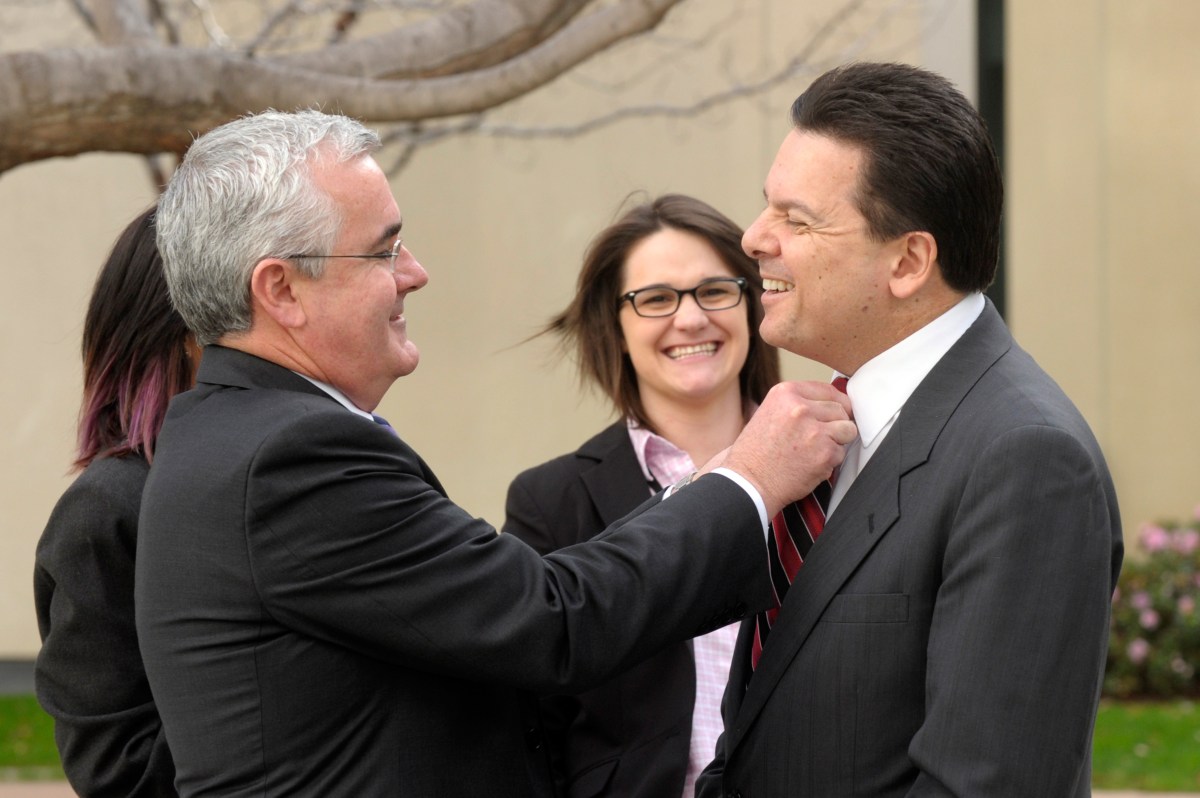Richardson: Gambit risks poisoning Xenophon’s brand

A typical Xenophon stunt: wheeling Australian-made crockery into the Parliament House dining room last year.
Nick Xenophon has long straddled an awkward line between flippant and fanatical.
He has forged a public image on wacky political stunts, but a private reputation for an intense work ethic, fuelled by a passion that occasionally borders on obsession.
When one gets to a certain age, a common resolution amid the eternal struggle to balance the competing demands life and work throw at you is to learn to say ‘no’ more.
It’s not a resolution Xenophon has ever mastered.
His workload now, as one of the most in-demand federal crossbenchers, is monumental, punishing. He sounds perpetually harried. The turnover of his staff in recent years, for various reasons, has made his office look at times like a revolving door.
I’ve always considered the one-time Legislative Councillor and later Senator well-intentioned. If his public persona balances drollery with diligence, his political radar is finely attuned to issues that generally tick off two obvious boxes: populism and fairness. He is naturally drawn to causes that resonate with the broader electorate. But they have often tended, too, to be causes few else will touch. He’s the guy who gives David the sling to fight Goliath.
I’m a longstanding political cynic, but it’s hard to be cynical about Xenophon’s motivations after hearing the endorsements of those for whom he has advocated over the years.
The pay-off, though, has been electoral success unheard of for an independent candidate, and popularity that major party leaders could only dream of. In 2013, Xenophon’s team won a quarter of the statewide senate vote. In 2006, he single-handedly outpolled the entire Liberal Party in the Upper House, responding with a typically awkward mix of modesty and outlandish showmanship, by sheepishly slinking along Rundle Mall wearing a sandwich board that read “Thank-You.”
At the time, I was working for The Australian newspaper, and the Adelaide bureau put the story up as a stand-alone election follow; it was rebuffed by the top table in Sydney, with one decision-maker sneering back: “Mate, he just looks like some bloke with a sandwich board.”
Touche.
Of course, a year later the Xenophon brand went national, and the national press suddenly couldn’t get enough of him. The bloke with the sandwich board became one of the hottest commodities in politics. His penchant for stunts became less outlandish but, in an age of party-driven media management, he still provided more colour and movement than most.
As a result, he is given more leeway than many of his contemporaries. Media industry insiders are well aware that Xenophon invariably stars in the end-of-year ‘gag reel’. This is because he frequently stops mid-sentence and rethinks his line. Again. And again. And again. But the line is usually so good that it will get a run Australia-wide. The outtakes are saved for the Christmas reel. This no doubt rankles with other politicians, whose frequent on-camera faux pas are more often fodder for the nightly news.
It’s also arguable that Xenophon is held to account with less rigour than his contemporaries. For all his good and dedicated work, his decision to name and shame a Catholic priest in Federal Parliament for alleged sex abuse – an allegation denied and never proven – was a low point not only in Xenophon’s career but in the nation’s recent political life. He later admitted the move was a mistake, but lamely deflected responsibility, declaring he found it “bewildering and extraordinary that no one in the Catholic Church decided to advise me the priest in question was about to go on leave”.
This week, Chris Kenny, writing one of his many News Corp columns, reflected on Xenophon’s career, and concluded it was, like so much about the man, an awkward contrast. A marriage of dazzling political success and very little public policy achievement. This is unfair, I think, as it is beholden on crossbenchers to advocate as well as legislate, and Xenophon is one of the strongest and most earnest advocates in the business.
But where Kenny is unquestionably correct is that Xenophon, for all his media nous and national profile, is still a somewhat unknown quantity politically. Even those who worked alongside him for years in parliaments state and federal couldn’t place him on a scale of left to right. Perhaps it’s because he approaches each issue on its own merits. Sometimes his moral or economic conservatism imposes itself, but at other times his social conscience or anti-corporate zeal suggests an Old Labor bent. He began political life as a Young Liberal, but often formed a bloc with Democrats and Greens in state parliament, while most often managing to keep then-Premier Mike Rann firmly offside.
If you judge him by the company he keeps, the puzzle gets curiouser and curiouser. He has appeared alongside everyone from Rann (when he was Opposition Leader), to Clive Palmer, to former DLP Senator John Madigan, to Andrew Wilkie, to Barnaby Joyce, to Jacqui Lambie.
Perhaps he just can’t say ‘no’.
It’s no surprise other crossbenchers seek him out like mosquitoes to a lantern; he does after all radiate the effervescent glow of political success.
His reputation is of an electoral Midas Touch; his backing no doubt helped deliver an unlikely victory for Kris Hanna in Mitchell in 2006, and more recently saw his running mate John Darley re-elected for a second term. Thus, hopefuls line up outside his door to beg for his endorsement, in a manner not entirely unlike the Godfather’s opening scenes.
Strangely, though, if there’s one thing on which that ineffable political radar of his has often let him down, it’s picking his allies.
His first running mate, and the one to whom he probably owes his political career, was Bob Moran. He was then a well-known and jaded second hand car salesman, with a high profile courtesy of his TV ads featuring the “Dodgy Brothers” duo. In 2007 Moran agreed to a lifetime ban from dealing cars, after a judge agreed he posed “a significant risk” to consumers, having failed to pay $165,000 in sale proceeds to buyers during 2004 and 2005.
Then there was Ann Bressington, who tipped a bucket on Xenophon after he quit State Parliament to run for the Senate, and later forged an inauspicious niche on the political fringe railing against fluoride in drinking water and other pet causes.
Conscious of these historic misjudgements, what are we to make of the fact Xenophon is currently amassing an army of acolytes to run in every SA seat, and some others besides, at next year’s federal election?
Xenophon is clearly acutely aware of his past recruiting errors, insisting he is thoroughly doing his “due diligence” on each and every candidate. But what does this mean?
Is he hand-picking candidates, or merely inviting applicants and assessing them one by one?
He says his party has more than 1000 members Australia-wide, but he remains the public face.
Last week, the Greens got into political embarrassment when InDaily revealed the farcical nature of their grassroots ballot for Penny Wright’s casual Senate vacancy, which is entirely up to the party rank and file apart from the fact that a five-person assessment panel helpfully provides them with a none-too-subtle How To Vote card.
The revelation is important, as Australians deserve to know the process by which those who purport to represent them are selected. But at least Greens party candidates have to impress a panel, and major party hopefuls have to win over a local branch majority, however carefully stacked.
The Xenophon Team selection process is a mystery, more clandestine than any major party pre-selection.
It may be robust and rigorous, but no-one really knows.
It sounds more like a glorified job interview, with Xenophon and his running mate Stirling Griff the prospective employers.
But if Xenophon is to present a motley assortment of parliamentary aspirants under his banner, we must be convinced that they stand for his values, and not even those who have served with Nick are 100 per cent clear what those are. Will these candidates be right, left or centrist? Will they be expected to vote as their notional leader dictates, or are they all effectively independents cashing in on the Xenophon imprimatur? He says he hopes the party model will evolve away from his brand in years to come, but towards what? And when?
While this has the potential to take Mr X’s political legacy to uncharted new heights – a lower house seat far from beyond the realms of possibility – it also has the potential to go horribly, horribly wrong. Just look at Pauline Hanson; look at Clive Palmer. Nick Xenophon got where he is today because he was Nick Xenophon, that humourous, hard-working political conundrum. This venture risks not only diluting, but poisoning his own brand.
Tom Richardson is a senior journalist at Indaily.
His political column is published on Fridays.





